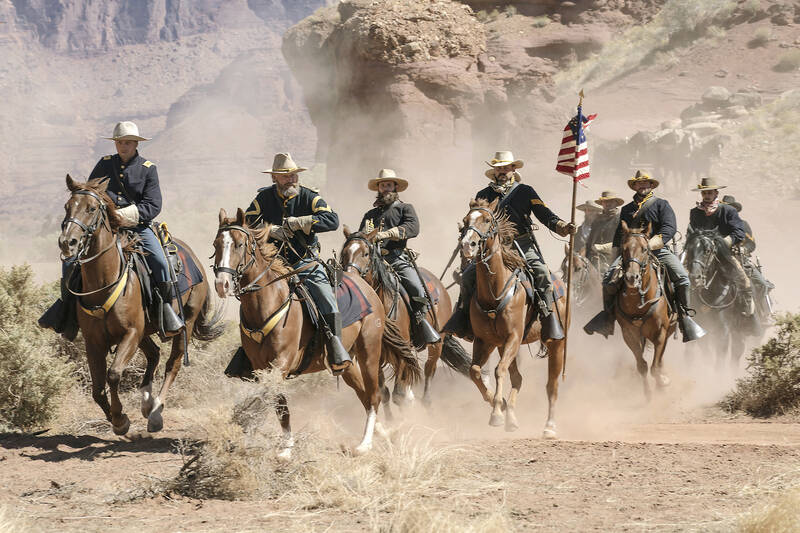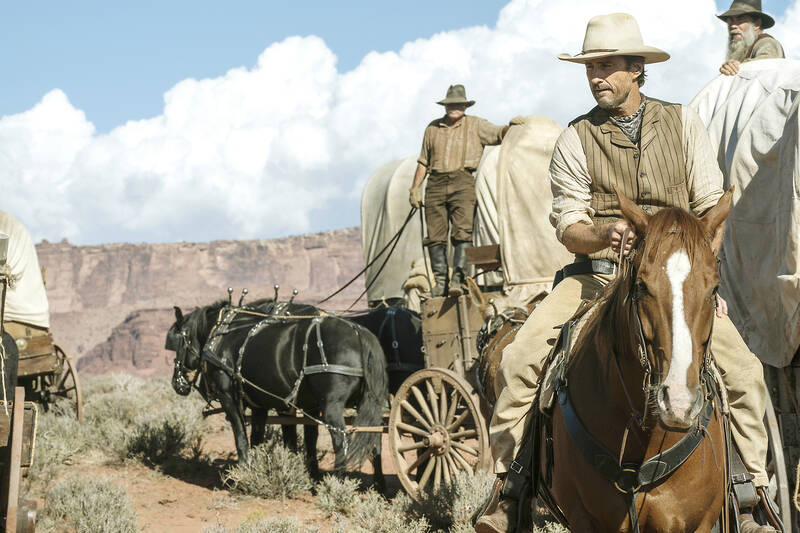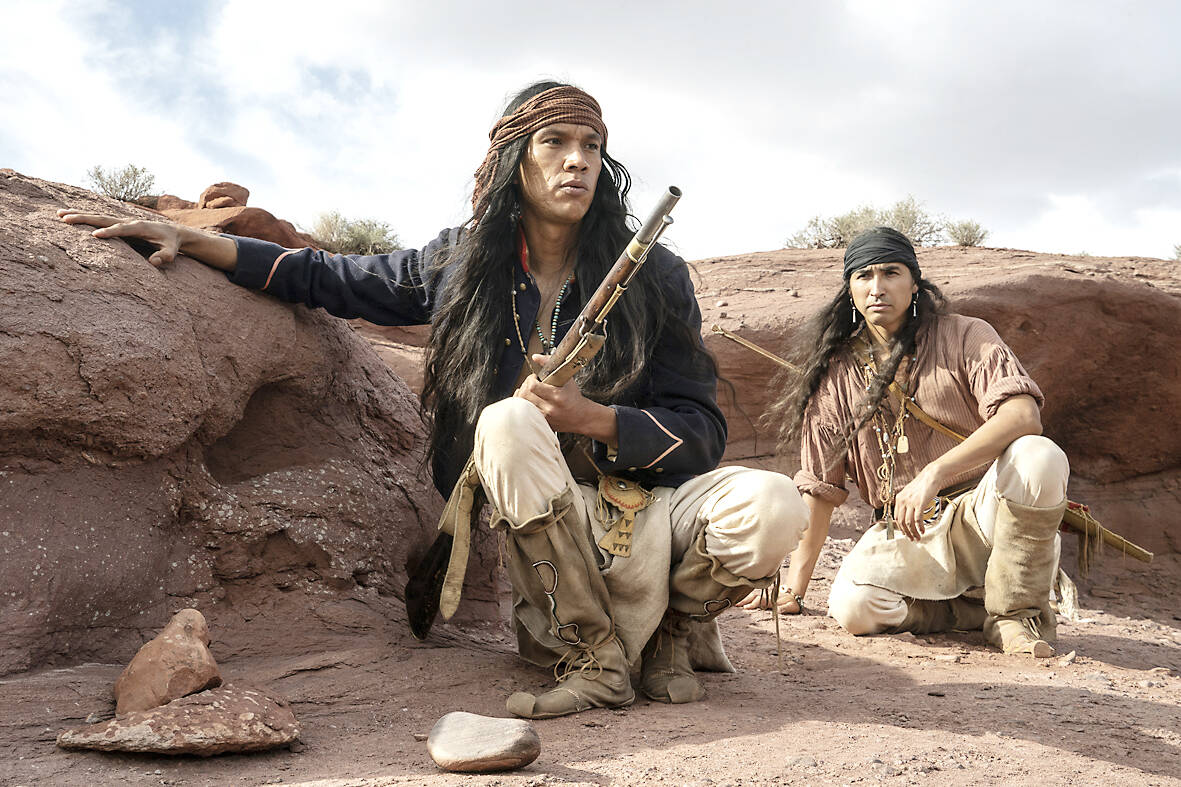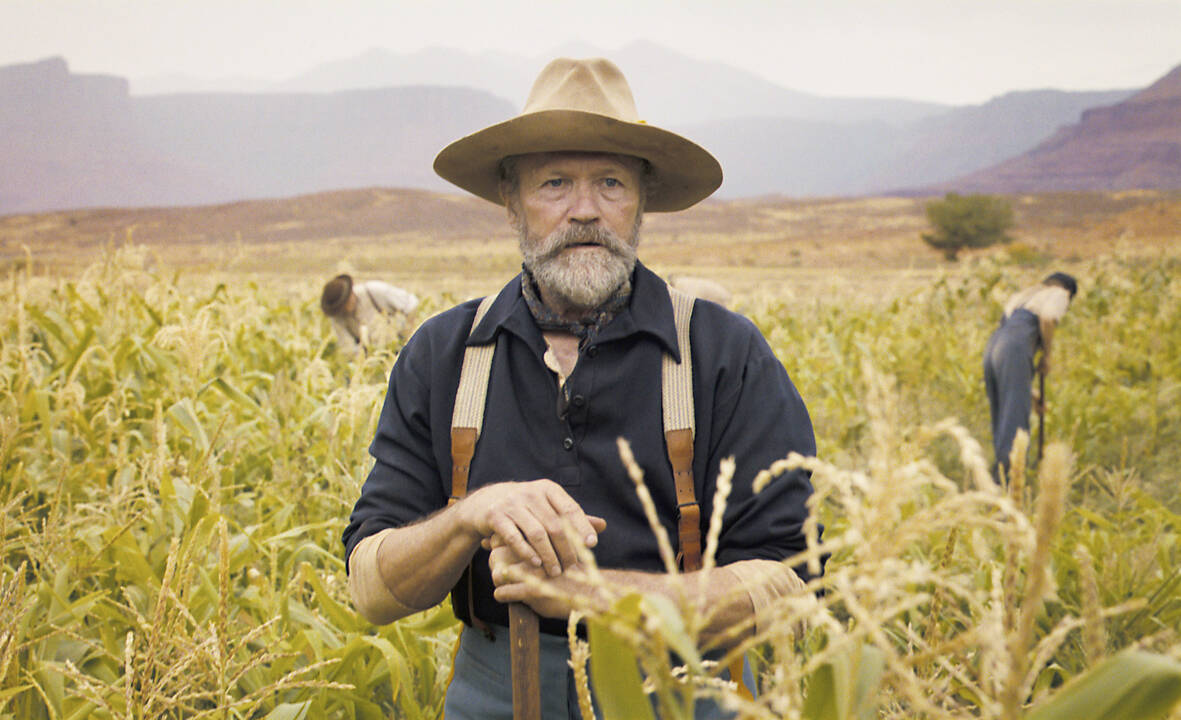There’s a scene deep into Kevin Costner’s new Western when he and a woman are fleeing bad guys on horseback. They pause at a jaw-dropping vista and he turns to her: “You just gotta keep going,” he says.
That should be the slogan of Horizon: An American Saga — Chapter 1, the initial three-hour salvo in what could morph into a four-part epic about the West that could tax even the biggest cowboy fan.
Give Costner — co-writer, director, producer — his due. This is a labor of love he’s been thinking about since the 1980s and he has skin in the game: He took out a mortgage on his 10-acre home in Santa Barbara, California. Well, one of his homes, at least. He’s not a total idiot.

Photo: AP
Chapter 1 — Chapter 2 is to be released in August and parts three and four depend on if folks keep going — is a sprawling, often unwieldy placesetter, introducing dozens of characters in different parts of the West who, one has to assume, will interact at some point. If they survive, that is.
It’s a spectacularly unsubtle movie, from the opening moment when a group of ants on a hill of dirt are crushed by a surveyor’s wooden stake. If there’s any doubt what we must feel, listen to John Debney’s ponderous, pretentious score, with its criminal overuse of cellos.
Costner scrambles the plot — crafted by him and Jon Baird — almost immediately by offering a climactic battle scene within the first half hour, one in which a small white settlement in Arizona’s San Pedro Valley (thanks, southern Utah!) is sneak-attacked by Apaches during an innocent dance.

Photo: AP
It’s a slaughter and it lasts way too long — savagery on one side, noble victims on the other. Mothers are struck by arrows while carrying their babes, unarmed musicians killed without a thought. “Ready son?” asks a dad to his teenage son, handing him a rifle and facing certain death. “I think so, dad,” comes the plucky reply. In the aftermath, a mother cradles the corpse of her son and talks to it.
This slaughter shoots off a few story strands — some survivors (like spunky new widow Sienna Miller and her daughter) find shelter at a US Army camp led by an achingly honorable lieutenant, played by Sam Worthington. Another story arc sees bounty hunters go in search of the Apaches who attacked the settlement, seeking profit and revenge.
Horizon also shows the internal divisions within the Apaches, with the chief’s hothead son and new father (Owen Crow Shoe) ready to keep fighting. “Their sons will hunt you,” the chief warns. “I won’t sing for your victory today.” We learn that the white settlement violated agreements meant to calm the West.

Photo: AP
Costner’s universe is both fatalistic and inevitable. Both sides may be right and wrong, but there will always be another round of savagery.
“There’s no one on Earth going to stop these wagons from coming,” an exasperated Army officer says at one point.
After an hour, Costner himself arrives, a quiet, strong loner who enters a Wyoming Territory settlement with the hope of a nice drink and some lady company and yet who leaves on the run, protecting a sex worker (Abbey Lee) and a boy in her care from psychotic horsemen who wish them harm.

Photo: AP
Two hours into the movie comes another whole set of characters, with Costner’s menu now completely out of whack. It’s a wagon train led by Luke Wilson (never a cowboy, ever) who is facing some class issues — a well-off, oblivious couple are among the working-class muscle — and some Peeping Toms. It’s all too much, but add to it a dash of anti-Chinese xenophobia, some budding romances and horrific scalping.
Director of photography Michael Muro doesn’t romanticize anything, grinding the action in the smoke, heat and chicken-pecked dust of the West, so much so that you might taste grit in your teeth at some points. It helps that Costner has positioned everyone on the top of a picturesque hillside, showing off their profiles.
Part of the problem of Chapter 1 is that in addition to overstuffing it with too many characters, the editing is pretty bad. Viewers will struggle with some violent cuts in which Costner has jumped the action forward months within the same chapter without any clues.
Yet Costner is still an impressive director with a eye for the natural beauty of the American West and a soft spot for loners. Yes, Horizon: An American Saga — Chapter 1 is a huge swing that cannot really stand on its own. But we owe it to him to ride beside him a little more. Let’s see if he can stick the landing.

In the next few months tough decisions will need to be made by the Taiwan People’s Party (TPP) and their pan-blue allies in the Chinese Nationalist Party (KMT). It will reveal just how real their alliance is with actual power at stake. Party founder Ko Wen-je (柯文哲) faced these tough questions, which we explored in part one of this series, “Ko Wen-je, the KMT’s prickly ally,” (Aug. 16, page 12). Ko was open to cooperation, but on his terms. He openly fretted about being “swallowed up” by the KMT, and was keenly aware of the experience of the People’s First Party

Aug. 25 to Aug. 31 Although Mr. Lin (林) had been married to his Japanese wife for a decade, their union was never legally recognized — and even their daughter was officially deemed illegitimate. During the first half of Japanese rule in Taiwan, only marriages between Japanese men and Taiwanese women were valid, unless the Taiwanese husband formally joined a Japanese household. In 1920, Lin took his frustrations directly to the Ministry of Home Affairs: “Since Japan took possession of Taiwan, we have obeyed the government’s directives and committed ourselves to breaking old Qing-era customs. Yet ... our marriages remain unrecognized,

Not long into Mistress Dispeller, a quietly jaw-dropping new documentary from director Elizabeth Lo, the film’s eponymous character lays out her thesis for ridding marriages of troublesome extra lovers. “When someone becomes a mistress,” she says, “it’s because they feel they don’t deserve complete love. She’s the one who needs our help the most.” Wang Zhenxi, a mistress dispeller based in north-central China’s Henan province, is one of a growing number of self-styled professionals who earn a living by intervening in people’s marriages — to “dispel” them of intruders. “I was looking for a love story set in China,” says Lo,

During the Metal Ages, prior to the arrival of the Dutch and Chinese, a great shift took place in indigenous material culture. Glass and agate beads, introduced after 400BC, completely replaced Taiwanese nephrite (jade) as the ornamental materials of choice, anthropologist Liu Jiun-Yu (劉俊昱) of the University of Washington wrote in a 2023 article. He added of the island’s modern indigenous peoples: “They are the descendants of prehistoric Formosans but have no nephrite-using cultures.” Moderns squint at that dynamic era of trade and cultural change through the mutually supporting lenses of later settler-colonialism and imperial power, which treated the indigenous as